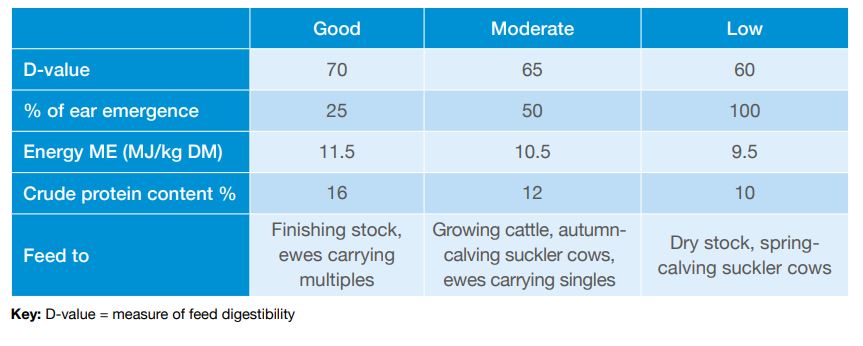Silage – why it is important to analyse
Wednesday, 31 May 2023
The day the silage contractor arrives at the farmyard is one of the most expensive days on the farm. With increased costs, it is more important than ever that it is done right.
Understanding the grass quality will enable you to plan for silage fermentation and help you plan your grass and forage throughout the season. It will also allow you to optimise feed value and livestock productivity.
The challenge is to produce enough winter forage at an appropriate quality for the stock that is going to eat it.
What are the benefits of a nutritional evaluation?
The quality of the silage will have a considerable impact on the nutrition and dry matter consumption of the livestock and, in turn, their performance.
Analysing silage samples helps determine the nutritional composition, including protein, fibre, energy content, and mineral levels. This information is crucial for formulating balanced diets for livestock, ensuring they receive adequate nutrition for growth, reproduction, and overall health.
By analysing your forages, livestock nutrition plans can be managed more efficiently and reliably to improve animal welfare, maintenance needs, productivity, and profitability.
What is its fermentation quality?
Silage fermentation is a complex process influenced by factors like moisture content, compaction, and the presence of bacteria and yeasts.
Analysing silage samples allows for evaluating the fermentation quality, including pH, lactic acid content, volatile fatty acids, and ammonia nitrogen levels.
Proper fermentation ensures the preservation of nutrients and minimises the growth of undesirable micro-organisms that can lead to spoilage and reduced feed quality.
How does this link to animal performance?
The quality of forages directly affects the performance and productivity of livestock. Analysing samples helps predict animal intake, digestibility, and feed efficiency.
By understanding the nutritional value and fermentation quality of silage, farmers and nutritionists can make informed decisions about feed management and optimise animal performance, such as milk production or liveweight gains.
Regular analysis of forage samples enables farmers and nutritionists to monitor and control the quality of silage production over time.
It helps identify variations in nutritional composition and fermentation parameters, allowing adjustments in management practices or feed formulations to maintain consistent and high-quality silage.
Understanding forage analysis
After you receive a copy of the analysis report, it is important to take the time to understand the values and how this may affect diet formulations, dry matter intakes and animal performance.
The key nutritional parameters to evaluate are:
- Dry matter (DM) (%) – a measure of what is ‘not’ water. If the silage is too wet (less than 25% DM), it can be difficult for animals to eat enough to meet their needs
D-value (%) – a measure of feed digestibility. The higher the D-value, the less concentrates will be needed to balance a rotation - Metabolisable energy (ME MJ/kg DM) – a measure of the usable energy available to the animal when fed. When buying a supplement, make sure the ME is higher than that of the forage
- Crude protein (CP) (%) – a measure of the protein content (but not protein quality). It is important to provide enough protein in supplementary feeds to make up for any shortfall in the forage
- pH – a measure of acidity. Target pH will vary depending on the DM% of silage. Less than 3 or higher than 5 suggests poor fermentation
- Ash (%) – a measure of mineral and trace element content. For grass silage, a maximum of 8% should be the target. Silage with 10% ash reduces the ME and indicates soil contamination and poor fermentation
Table 1: Targets for silage quality
Further information
Making grass silage for Better Returns


